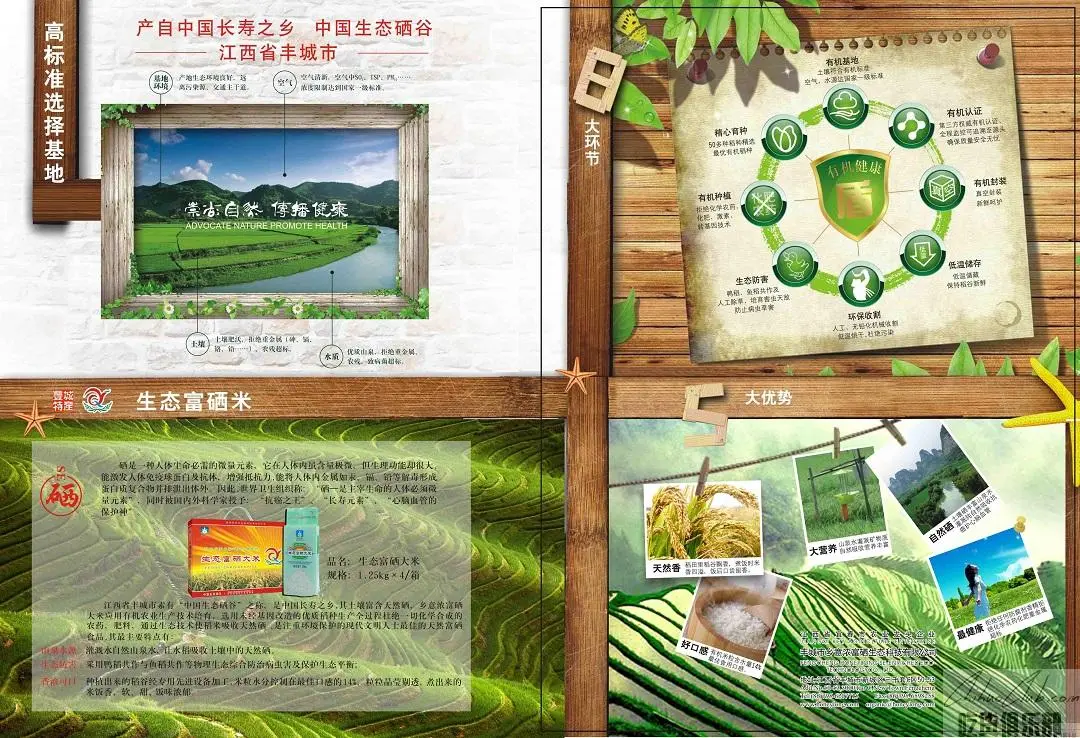
Fengcheng selenium-rich Rice
-
Update date::
-
Date of protection::
-
Protected range:Fengcheng selenium-enriched rice is produced in Dongjia Town, Hutang Township, Meilin Town, Shangzhuang Street, Qiaodong Town, Hehu Township, Licun Town, Railway Town, Luoshi Town, Xiushi Town, Quanzhou, Fengcheng City, Jiangxi Province. 11 townships and towns in Gangzhen Township have administrative areas.
-
Related origin:jiangxi yichunshi1 fengchengshi1 fengchengshi1-dongjiazhen fengchengshi1-hutangxiang fengchengshi1-meilinzhen fengchengshi1-shangzhuangjiedao fengchengshi1-qiaodongzhen fengchengshi1-hehuxiang fengchengshi1-licunzhen fengchengshi1-tieluzhen fengchengshi1-luoshizhen fengchengshi1-xiushizhen fengchengshi1-quangangzhen
-
Category:
The unique quality of Fengcheng selenium-enriched rice is mainly reflected in two aspects. First, the content of organic selenium is high, and second, the enrichment process of selenium is completely carried out under natural conditions.nHigh selenium content, especially high organic selenium content is the most important feature of Fengcheng selenium-rich rice. In addition to the high total selenium content and high organic selenium content, the characteristics of Fengcheng selenium-rich rice have another feature. It is natural selenium.
At present, there are three ways to enrich selenium in food: one is artificial selenium enrichment, that is, selenium is added to soil and plant stems and leaves by spraying a reasonable concentration and ratio of sodium selenite and sodium selenate solution to the soil and plants. Content, this method will not only affect the enrichment of selenium, but improper use will also affect the normal growth and environmental problems of crops. The second method of selenium enrichment is microbial selenium enrichment That is, the use of microorganisms to convert inorganic selenium into organic selenium. This method can only produce selenium-enriched food additives and cannot enrich selenium in naturally growing plants. The third method of selenium enrichment is natural selenium enrichment. That is, the use of environmental (soil or water) characteristics to achieve selenium-enriched requirements. Fengcheng selenium-enriched rice is a natural selenium-enriched product that grows completely in the natural environment. The organic selenium in the product accounts for more than 90% of the total selenium content.
Fengcheng selenium-enriched rice quality technical requirements First, the variety "Hometown" series and other varieties. Second, the site conditions The place of production has the conditions of conventional paddy field. The soil contains 0.3 to 0.99 mg/kg of selenium and a pH of 5.9 to 6.8. Third, cultivation management The use of single season late rice planting. 1. Sowing time: dry nursery or paddy field nursery, planted from April 15 to 20. 2. Transplanting: The transplanting density is 300,000 to 350,000 plants per hectare, and 6 to 8 seedlings per well. End the transplant before June 5. 3. Fertilization: use organic fertilizer and farmer's decomposed fertilizer. The amount per hectare is greater than or equal to 3 tons. Disable fertilizer and plant growth regulators. 4. Irrigation: Irrigation water is treated with groundwater (drought-resistant well extraction) or local water stocks. Disabling unidentified sources of water flowing into rivers or in the field. 5. Prevention and control of pests and diseases: (1) Pests and diseases: using biological pesticides, feeding natural enemies and light swatches to induce and control. (2) Weeding: Artificial weeding in the field at the heading and maturity stages. The herbicide is disabled. 6. Environmental and safety requirements: The use of pesticides, fertilizers, etc. must comply with relevant national regulations and must not pollute the environment. 4. Harvesting Harvest in time from late September to early October. Carry out the collection, split the sun, remove the grain and dry it for storage. Fifth, the processing technology Paddy → clean up → shelling → rice milling → selection → storage. Sixth, quality characteristics 1. Sensory characteristics: rice grain is slender, crystal clear, no belly white, after cooking, there are "fragrance, sweet, soft, slippery" characteristics. The rice is smooth and delicious, soft and not sticky, and lasts for a long time. 2. Physical and chemical indicators: selenium content of 0.07mg/kg to 0.3mg/kg, amylose content of 14% to 20%. 3. Safety and other quality technical requirements: Product safety and other quality technical requirements must comply with relevant national regulations.
Apply to:
Producers within the scope of the production of Fengcheng selenium-rich rice may apply to the Fengcheng Quality and Technical Supervision Bureau of Jiangxi Province for the use of the “Special Mark for Geographical Indication Products”, which is reviewed by the Jiangxi Provincial Bureau of Quality and Technical Supervision and reported to the AQSIQ for approval. Announced. The statutory testing agency for Fengcheng selenium-rich rice is designated by the Jiangxi Provincial Bureau of Quality and Technical Supervision.